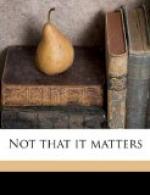In the more human art of interviewing I should be equally at fault. The interview itself would be satisfactory, but I am afraid that its publication would lead people to believe that all the best things had been said by me. To remember what anybody else has said is easy; to remember, even five minutes after, what one has said oneself is almost impossible. For to recall your remarks in our argument at the club last night is simply a matter of memory; to recall mine, I have to forget all that I meant to have said, all that I ought to have said, and all that I have thought upon the subject since.
In fact, I begin to see that the successful reporter must eliminate his personality altogether, whereas the successful literary journalist depends for his success entirely upon his personality —which is what is meant by “style.” I suppose it is for this reason that, when the literary journalist is sent as “our extra-special representative” to report a prize fight or a final cup tie or a political meeting, the result is always appalling. The “ego” bulges out of every line, obviously conscious that it is showing us no ordinary reporting, determined that it will not be overshadowed by the importance of the subject. And those who are more interested in the matter than in the manner regard him as an intruder, and the others regret that he is so greatly overtaxing his strength.
So each to his business, and his handbook to each—How to Write for the Press to the special representative, and How to Be an Author to the author. There is no book, I believe, called How to Be a Solicitor, or a doctor or an admiral or a brewer. That is a different matter altogether; but any fool can write for the papers.
Smoking as a Fine Art
My first introduction to Lady Nicotine was at the innocent age of eight, when, finding a small piece of somebody else’s tobacco lying unclaimed on the ground, I decided to experiment with it. Numerous desert island stories had told me that the pangs of hunger could be allayed by chewing tobacco; it was thus that the hero staved off death before discovering the bread-fruit tree. Every right-minded boy of eight hopes to be shipwrecked one day, and it was proper that I should find out for myself whether my authorities could be trusted in this matter. So I chewed tobacco. In the sense that I certainly did not desire food for some time afterwards, my experience justified the authorities, but I felt at the time that it was not so much for staving off death as for reconciling oneself to it that tobacco-chewing was to be recommended. I have never practised it since.
At eighteen I went to Cambridge, and bought two pipes in a case. In those days Greek was compulsory, but not more so than two pipes in a case. One of the pipes had an amber stem and the other a vulcanite stem, and both of them had silver belts. That also was compulsory. Having bought them, one was free to smoke cigarettes. However, at the end of my first year I got to work seriously on a shilling briar, and I have smoked that, or something like it, ever since.




